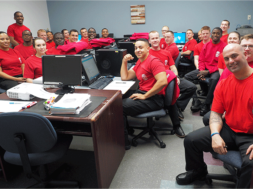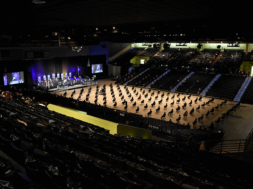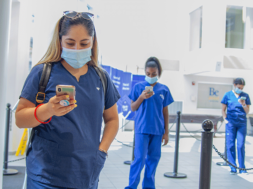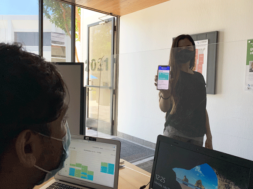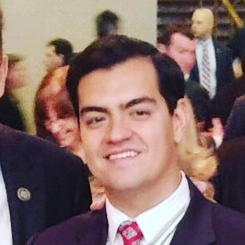
Fostering a Culture of Collective Security
By Robert M. Keiser M.B.A., Executive Director, Southeastern College/Southeastern Institute
As a citizen of the great state of Florida, a previous resident of the city of Parkland, and a current member of academia, last year’s school shooting at Marjory Stoneman Douglas (MSD) has hit very close to home. My thoughts and emotions have ranged from pure outrage to profound sadness, to utter confusion. Unfortunately, MSD is just one of many recent school shootings. I have often wondered if society is becoming desensitized to school shootings as they seem to occur so frequently.
This startling trend of shootings on campus, and other acts of violence is our new reality and cannot be met with complacency or self-assuredness but instead must be met with action and decisive leadership.
Protecting institutional stakeholders is not only ethically correct, but it is also the best way to protect the institution from liability. Most campuses employ some form of security such as a mass communication system, blue-boxes, security guards, etc. At Southeastern College/Southeastern Institute we go to great lengths to ensure our campus-based stakeholders are safe. Safety initiatives encompass a layered approach that includes, but is not limited to, written policies and procedures, positioning armed guards on campus during all operational hours, equipping our faculty and staff with walkie-talkies and panic buttons, mandating the use of identifications badges for visitors, and utilizing an alert/emergency information system. Additionally, the campus staff is trained as operational Campus Response Teams (CRT) and participate in regular crisis training. Students, staff and faculty are also provided emergency hotline information, including an institutional Ombudsman where they may seek assistance as well as vocalize concerns.
Although our institution goes to great lengths and costs to ensure the security of our students, staff, and faculty, I do not believe that any strategy or initiative is effective enough to prevent acts of mass violence on campus. Sadly, it is clear that campus-based security has not been effective enough in preventing mass shootings or other acts of violence. These incidents have occurred at well-capitalized schools with robust security frameworks and at institutions with lesser means of deterrence. I firmly believe that security frameworks are important facets of campus security and should continue to be invested in, but without the creation of a culture of collective security, I believe these security frameworks can provide a false sense of security. In fact, it is of pinnacle importance that institutional leaders must not become complacent and rely on their investments. Instead, it is imperative that campus administrators understand that even the most modern security systems serve simply as a deterrent to acts of violence and not an irrefutable answer to the threat of mass violence. To truly protect an institution from the threat of a mass shooting a culture of collective security must be fostered and invested in.
In an attempt to mobilize all university stakeholders in a collective approach to security we discuss and demonstrate our Crisis Response, Alert Now, and Ombudsman systems during orientation. We instruct students to report suspicious activities to faculty and campus administration. Additionally, we conduct regular active shooter, bomb threat, fire, natural disaster, shelter in place, emergency and external lockdown, and conflict resolution drills. We consistently collect recent contact information from students so they can stay in touch with administration during all crisis related matters and we utilize satellite phones in case normal communications with students and campus-based personnel are severed. All guest on campus must be issued a visitor and parking pass. Must know emergency information, and safe living off campus brochures are circulated to all our students along with external and internal security resources published on our website.
The key to these initiatives is that all of these security measures are regularly discussed, practiced, and involve all university stakeholders, including students.
University stakeholders, including students, must understand that they play a pivotal role in protecting university life. The value of collective security must become constantly preached and practiced and must become as important as any operational KPI or institutional outcome. To do this, we discuss security in management meetings, have regularly scheduled CRT meetings, and hold institutional actors responsible for their crisis preparation and response. Additionally, we encourage institutional leaders to ask for feedback from stakeholders to improve security frameworks and to collect information. We instruct the administration to promote and practice psychological safety to ensure that feedback is not criticized if threats do not materialize, and a culture that articulates each stakeholder’s role and importance in preventing violence on campus.
The power of a culture of collective security is bolstered by modern technology and the investments that campus administrators make for security purposes. In this vein, nearly every student and university employee has a smartphone. With modern cellphone technology, it is completely feasible to communicate with all stakeholders in an immediate fashion via voice, text, or app. This provides institutions incredible ability to disseminate news of a threat to both internal and external actors and to activate a collective defense against the advent of a mass shooter. With modern technology, if stakeholders are trained and are vigilant, all institutional stakeholders can play a role in protecting each other and foiling potential acts of violence. Thus, the power of campus-based security frameworks is reliant upon the vigilance and buy-in of all campus stakeholders, not the investments made in preventing potential acts of violence. If all campus-based stakeholders see themselves as pivotal cogs in an institutional security framework a collective culture of security will serve as the best protection against acts of violence.
Hopefully, Marjory Stoneman Douglas and other similar tragedies have manifested that it is no longer acceptable to tell ourselves that it will not happen to us and we, therefore, do not need to worry. On the contrary, we must accept this new reality and become active participants in a collective framework of security.
ROBERT KEISER, raised in Fort Lauderdale, Florida, has lived in Washington D.C. and Barcelona, Spain but now resides full-time in Delray Beach, Florida. Robert holds a Bachelor’s of Science as well as a Master of Business Administration (MBA) from The George Washington University in Washington D.C. Robert is also currently pursuing a Ph.D. in Higher Education Leadership from Capella University.
Robert Keiser currently serves as the Executive Director of Southeastern College and Southeastern Institute and was previously the Campus President of Southeastern College’s West Palm Beach Campus. Robert Keiser previously worked at Keiser University’s Fort Lauderdale, West Palm Beach, and Port St. Lucie campus. During his experience with Keiser and Southeastern, Robert has worked in admissions, financial aid, academics, and governmental relations. Prior to his time in Higher Education, he worked for U.B.S Financial Services in wealth management and Skanska USA, construction management, in business development. He also served as an appointee to Florida Governor Crist’s Governor’s Council on Physical Fitness. In this capacity, he contributed to a state action plan to combat childhood obesity and testified before U.S. Congress on behalf of the FIT Kids Act; an act mandating one hour of physical education in America’s public schools.
Contact Information: Robert M. Keiser, M.B.A. // Executive Director // Southeastern College/Southeastern Institute // 954-261-5135 // rkeiser@sec.edu // www.sec.edu; http://www.southeasterninstitute.edu




